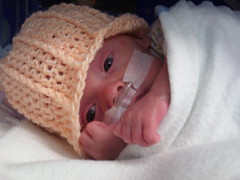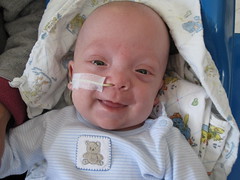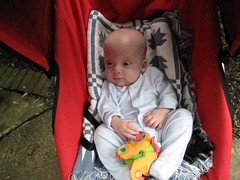Carolyn and I had an all-hands meeting with the HSC team today. Compared with the same meetings at Georgetown there were fewer doctors and more therapists, reflecting HSC's tilt towards lower intensity, family centered care. Carolyn made a big impression right away by introducing me to each of the specialists by name; not even the case manager could keep everyone straight. In addition to the standard set of therapists (speech, occupational and physical) there was a nutritionist, a psychologist and family life specialist. The psychologist was there in case we wigged out, I think. The family life specialist gave us a strategy for explaining to Felix where we were all day and what was happening to Max. She gave us a baby boy doll that she had augmented with a feeding tube taped to its nose. But her speciality appeared to be alleviating parental guilt about not being at a baby's bedside all day.
Unlike the Georgetown team, which tended to hide bad news in plain sight by referring only obliquely to Max's neurological deficits, the HSC team were forthright. The physical therapist described her assessment of Max's neurological control over his body. The brain's interaction with the body's muscles is known as "tone", although I find this term misleading. The cure for "low tone" is not exercise. Tone is purely a neurological issue. Max has "mixed tone" which means that his core or trunk has low tone while his extremities have higher tone, and the farther one gets from the brain the higher the tone. Many children with neurological problems also have GI problems. One reason that Max has such severe reflux may be because the tone of his esophagus is too low. The therapists emphasized that early intervention is the only way to tackle these problems, and that it does work. They'll be teaching us ways for Max to improve his core tone, which may allow him to relax his extremities. Firmer tone in his trunk may also help alleviate Max's reflux.
The HSC team have clearly seen many babies with reflux and feeding issues. They suggested a novel strategy for handling Max's reflux. They suggested placing an nj tube: this is a tube that bypasses the stomach and duodenum and goes to the jejunum, or small bowel. Max would get 12 hours of feeding via the nj tube at night. During the day he would get bottle feedings on demand or every three hours. The idea is that the nj tube would give him a break from the reflux and guarantee that he would get the nutrition he needed, while the bottle feedings would maintain oral competence and help him develop the capacity to deal with normal feeding. In addition, the HSC team hope that, with time and physical therapy, Max may outgrow the worst of his reflux.
After the meeting broke up (almost two hours!), Carolyn and I went to Max's bedside to admire him. He was in a good mood, but also clearly suffering from reflux. I sat Max on my arm and bounced him up and down for a while. He seemed to find this soothing and was drifting off to sleep when I left.
skip to main |
skip to sidebar

Max was born in October 2008 at Georgetown University Hospital. After more than four months at GUH, Max moved to the HSC Pediatric Center in March 2009. He came home six months after he was born, in April 2009.
A TUBE-FREE MORNING

Start Here: A list of posts with background information
- We're home! (leaving the hospital with Max)
- The hospital at home (what it's like to care for Max at home)
- Max in action (see Max do his tricks)
- How is Max? (update April 2009)
Most recent photos of Max
Blog Archive
-
▼
2009
(224)
-
▼
March
(39)
- Max, smiling
- Why don't we like orphanages
- Learning and forgetting
- Max at night
- Bath day, take two
- Bath day
- Max sleeping like a baby
- Max studies swallowing
- Going to Children's
- Max's big week continues
- Max's car ride to Children's
- Reminders from Georgetown
- Max too will ride the helter-skelter
- Max's new room
- Trip to the playroom
- Dr. Brown's Patent Medicine Bottle and Baby Soother
- Max catches a fish
- No "A" for effort
- Visiting day at HSC
- Blast from the past
- Carolyn passes the CPR test
- A quiet day
- CPR training video
- Shaky video day
- Laundry day at HSC
- Riding the 'J' train
- First family meeting at HSC
- Max's charm offensive begins
- HSC: Who, Where, What
- Everyone wants to blame the head
- First full day at HSC
- Graduating from the NICU
- The long good-bye
- Without a feeding tube
- Without a feeding tube
- Evening Update (3/3)
- Evening Update (Monday 3/2)
- Max taking a bottle
- Evening update (Sunday 3/1)
-
▼
March
(39)



